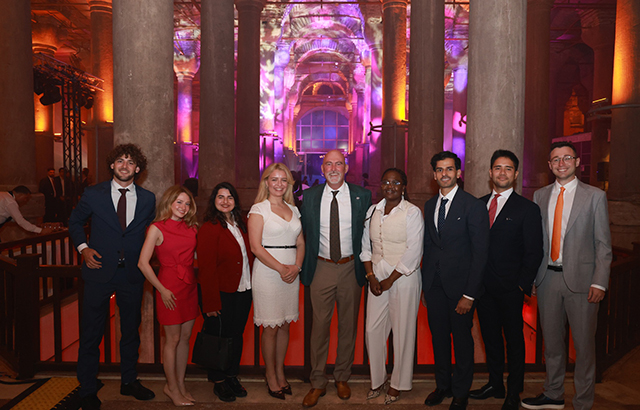Queen Mary LLM Students attended AIEN 2025 International Energy Summit
LLM students, Danica Jankovic, Ipek Ince and Nikolaos Tsironis from the Energy & Climate Change Law Institute, at Queen Mary University of London (QMUL) attended the Association of International Energy Negotiators (AIEN)’s annual International Energy Summit, in Istanbul.

Their participation was supported by the joint bursary granted by AIEN and Queen Mary.
Participating in the summit themed “Energy Crossroads: Meeting Society’s Energy Needs in a Changing World” in Istanbul was a genuinely eye-opening experience. As LLM students focusing on energy and climate change law, it gave us a rare chance to step outside the academic setting and learn directly from people working in the field every day. Listening to energy negotiators, lawyers, policymakers and technical experts speak about current challenges and future trends helped us better understand how the energy sector works in practice.
One of the highlights of the summit was the “Evolution of Model Contracts for New Energies” workshop. We took part in a fast-paced negotiation exercise between fictional countries, where each group had to decide what their country could offer in exchange for what it needed to develop its energy resources. Some of us were given the chance to present our teams’ proposals after which we moved from table to table to try and strike deals. The exercise showed how much strategy, clarity and teamwork go into negotiation, and how quickly lawyers must adapt qunder pressure.
Another session that particularly resonated with us was Dr Pedro van Meurs’ insightful talk on the future of Petroleum Energy Agreements (PEAs). Dr van Meurs presented a very strong case for rethinking how these agreements are structured to better support the energy transition. Dr van Meurs believes that the future PEAs should incorporate elements such as carbon capture and storage, lithium extraction and renewable energy generation - either directly or through linked permits. A well that does not produce oil could still turn out to be useful for CCS or lithium, and the legal framework should allow for such flexibility. He also addressed the varying scale and longevity of carbon removal operations from reforestation to direct air capture. It was one of the most practical and forward-thinking explanations we have encountered on how law can drive climate goals without losing sight of economic realities.
The networking events offered some of the most rewarding moments of the summit. We had the chance to talk to energy experts from all over the world. We were able to exchange ideas about different legal systems, cultural perspectives, and shared hopes for the future of energy. Many of these discussions laid the foundation for connections that felt both intellectually enriching and personally meaningful - some of which have already grown into lasting friendships.
We are truly grateful to the AIEN and Energy and Climate Change Law Institute for making this experience possible. Attending this summit is something every energy law student should aim for. It is not only a chance to learn, but a way to see where the future of the field is being shaped.
View more photos of our students at the AIEN 2025 conference.